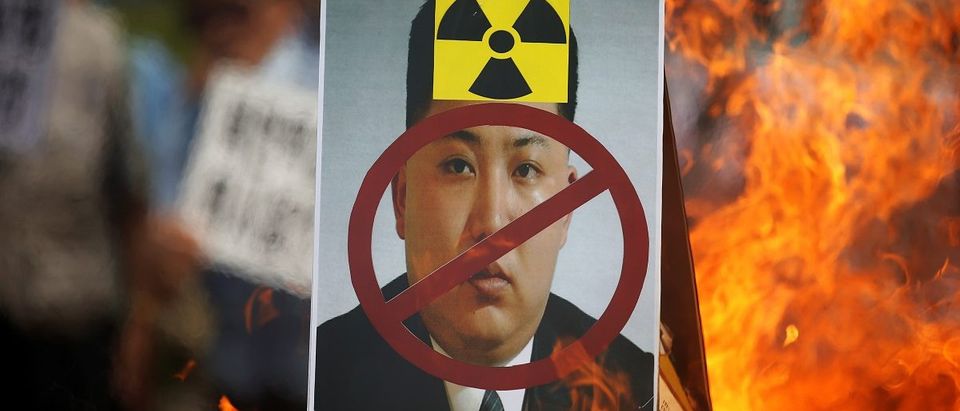South Korea will obliterate the capital of North Korea if it detects even the slightest hint of a nuclear attack, defense officials told The Korea Times.
The South Korean military has reportedly taken a zero-tolerance stance towards North Korea and plans to raze Pyongyang with a pre-emptive missile barrage if it suspects the North intends to launch a nuclear assault.
North Korea conducted its fifth and most powerful nuclear test Sept. 8. Not only did the North detonate a nuke with a yield of at least 10 kilotons, but it also allegedly miniaturized and standardized a nuclear warhead for its ballistic missiles. North Korea’s latest move has raised the stakes on the Korean peninsula. Perhaps even more daunting is that recent reports indicate that North Korea may have already completed preparations for a sixth nuclear test.
“The North’s capital city will be reduced to ashes and removed from the map,” an unnamed defense official informed The Korea Times.
“Every Pyongyang district, particularly where the North Korean leadership is possibly hidden, will be completely destroyed by ballistic missiles and high-explosive shells as soon as the North shows any signs of using a nuclear weapon,” the source added.
South Korea’s plans for the annihilation of Pyongyang is part of the Korea Massive Punishment and Retaliation (KMPR) strategy. The KMPR strategy was introduced by the South Korean National Assembly in response to North Korea’s fifth nuclear test Thursday, reports the Yonhap News Agency.
For the KMPR strategy, South Korea would mobilize its Hyunmoo ballistic missiles 2As, 2Bs, and 3s, which have ranges of 186.4 miles, 310.6 miles, and 621.3 miles.
South Korea intends to dramatically increase its supply of Hyunmoo ballistic missiles to ensure that it can deliver strikes against targets across North Korea. A ballistic missile with a range of 497 miles is in the works for next year, revealed The Korea Times.
South Korea has also reportedly created a special military unit “dedicated to targeting North Korean leadership and launching retaliatory strikes,” an unidentified inside defense source told the Yonhap News Agency.
The goal of South Korea’s plans is clear: the elimination of Kim Jong Un.
Some argue that such plans could exacerbate the North’s drive to produce a formidable nuclear arsenal.
“I am certain such statements only reconfirm in North Korea’s eyes the need for a survivable nuclear deterrent,” Victor Cha, a Center for Strategic and International Studies (CSIS) North Korea expert, told The Japan Times.
South Korea’s KMPR strategy suggests that the country is not overwhelmingly worried about the concerns of a man South Korea’s President Park Geun-hye called “fanatically reckless.”
South Korea’s rhetoric resembles the harsh statements regularly issued by the North. As the war of words heats up, a very real war appears to be on the minds of both South and North Korea.
“North Korea’s nuclear and missile programs are not a simple warning for negotiations but a realistic and imminent threat targeting us. It has warned of additional provocations, raising the risk of a war on the Korean Peninsula,” Park said Monday.
She wants to boost South Korea’s defenses, as well as secure guarantees from the U.S. regarding its nuclear umbrella. Park also reaffirmed her commitment to installing a Terminal High Altitude Area Defense (THAAD) missile shield in South Korea.
“I reiterate that a THAAD deployment by the U.S. army stationed in Korea is being pushed as part of efforts to counter North Korea’s threats and increase our self-defense,” she explained.
The United States will send supersonic B-1B Lancers to South Korea, and a nuclear-powered aircraft carrier, the U.S.S. Ronald Reagan (CVN-76), will take part in a joint U.S.-South Korea drill next month. Both are meant as shows of force, clear messages to North Korea.
“North Korea continues to present a growing threat to the region, to our allies, to ourselves, and we will do everything possible to defend against that growing threat,” said Sung Kim, United States Special Representative for North Korea Policy, according to BBC. “In addition to sanctions in the Security Council, both the US and Japan, together with South Korea, will be looking at any unilateral measures as well as bilateral measures as well as possible trilateral cooperation.”
Send tips to ryan@
All content created by the Daily Caller News Foundation, an independent and nonpartisan newswire service, is available without charge to any legitimate news publisher that can provide a large audience. All republished articles must include our logo, our reporter’s byline and their DCNF affiliation. For any questions about our guidelines or partnering with us, please contact licensing@dailycallernewsfoundation.org.


